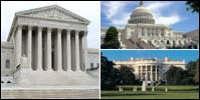
While several members of the legislative branch of the US Government are pressing for independent international investigations into Sri Lanka’s war-crimes, the US executive branch, despite the presence of ardent advocates of human rights as President Obama’s group of advisers, guided by Ambassador Robert Blake architected policy that has wrought havoc to Tamil justice, appears to support white-washing of war-crimes, Tamil circles in the US said. Civil society groups in Sri Lanka, which met visiting US officials recently have also reported hearing a Rajapakse-centric position from the officials, and revealed that the officials have tried to persuade the civil society to engage with the Sri Lanka Government on development and reconciliation, and thereby, to remain opposed to Tamil diaspora activities, civil society sources in Jaffna said.
PDF: US Senate Resolution 84 on Sri Lanka
United States Senate resolution S. Res. 84 introduced by Senator Casey and passed in March 2011, called "on the Government of Sri Lanka, the international community, and the United Nations to establish an independent international accountability mechanism to look into reports of war crimes, crimes against humanity, and other human rights violations committed by both sides during and after the war in Sri Lanka and to make recommendations regarding accountability," as one of the four elements of the resolution.
Letter to Clinton from 58 Senators
In August 2010, 58 US law makers in a letter to Secretary Clinton urged the Obama administration to call for an independent international investigation into alleged war crimes that occurred during Sri Lanka’s civil war.
PDF: Letter to Secretary Clinton
Further, three senior Senators in a communication to Clinton in November 2011, a few days before the LLRC report was released, said, "if the LLRC fails to meet the basic standards of credibility and independence that the United States has set forth, and the Sri Lankan government does not take steps to hold accountable those persons most responsible for War crimes on both sides of the conflict, We urge you to promptly press for an independent international accountability mechanism."
 |
|
Robert O’Blake, Former Ambassador to Sri Lanka |
 |
|
Hillary Rodham Clinton, U.S. Secretary of State |
 |
|
Senator Casey (D-Pennsylvania) |
In contrast, executive branch officials have routinely intimated simple solutions based on collaboration with Colombo to resolve chronic issues plaguing the Tamils in NorthEast, reflecting poor understanding of the conflict which has deep roots in decades of oppression, civil society sources in Jaffna said.
Recently four officials from the US Executive branch visited Sri Lanka and Jaffna. The officials, while addressing civil society groups and senior citizens in Jaffna, have reportedly conveyed the following sentiments, which observers noted, were indirectly aimed to turn the NorthEast Tamils against Tamil diaspora.
-
US will not make any reference to UN Panel report or International inquiry at the HRC meeting in March. Possibililty of a resolution against Sri Lanka is remote.
-
Positive aspects of LLRC report will be emphasized and US State Department will be satisfied if Sri Lanka takes measures to implement the recommendations.
-
Solutions to the Tamil issues are internal and there will no be no outside intervention
-
State Dept. is not interested in instituting accountability mechanism.
Statements from Mr Blake and the current US Ambassador in Sri Lanka, exposed by Wikileaks, have established prima facie evidence that the US diplomats knew of Sri Lanka high level officials’ complicity to war crimes:
- US diplomats were aware of theSystematic use of sexual abuse and rape (and killings, disappearances etc) by security forces and their paramilitaries
- Ambassador Blake knew that STF killed the five Trincomalee students in 2006.
PDF: Colombo US Embassy cable -
A January 2010 cable from US Embassy in Sri Lanka acknowledges that U.S. is cognizant of the fact that "responsibility for many alleged crimes rests with the country’s senior civilian and military leadership, including President Rajapaksa and his brothers and opposition candidate General Fonseka."
PDF: WikiLeaks: Robert Blake, 18 May 2007 -
A US embassy cable (18th May 2007) accuses Defense Secretary Gotabaya Rajapakse of giving orders to Sri Lanka Army (SLA) commanders in Jaffna not to interfere with Tamil paramilitaries who are "doing "work" that the military cannot do because of international scrutiny.
 |
|
Senator Patrick Leahy, current chairman of the Judiciary Committee |
 |
|
District Court Judge Colleen Kollar-Kotelly |
However, the seriousness of Sri Lanka’scrimes and the numbers of Tamil civilians killed by State action have not been sufficient for the US diplomats to take a stand against the perpetrators of the crimes, say Rights Groups including Human Rights Watch..
Further, knowledge of such evidence, and the documented acts to derail the peace process by Ambassador Blake may even fall into the realm of complicity to Crimes Against Peace, a criminal offense under international law, active Tamil diaspora sources said.
While "tension" prevails between the two branches of the US Government on Sri Lanka’s war-crimes, the US State Department has made matters worse by pro-actively intervening on behalf of Sri Lanka’s President in the judicial proceedings against Rajapakse. The State Department has sought to pre-empt the "checks and balances" provided by the third branch of the US Government, the judiciary, by "suggesting" immunity over war-crimes, and asking the judge to dismiss the war-crimes charges against Rajapakse without judicial review, according to legal sources in Washington.
Commenting on the intervention of the State Department in the war-crimes case against Rajapakse, the attorney for the plaintiffs noted, "among other deficiencies in the US Government’s legal analysis, we underscored the counter-constitutional proposition asserted by the Executive Branch that it was crowned with judicial power to order the dismissal of lawsuits based on its understanding of the law which federal judges were precluded from second-guessing. Such a putative power in the Executive Branch would blatantly flout the separation of powers enshrined in the Constitution."
Commenting on US’s conflicting stand on the issue of Sri Lanka’s war crimes, spokesperson for Tamils Against Genocide (TAG), a US-based activist group, said "Increasingly, US-Sri Lanka foreign policy on the matter of Tamil justice appears to comport with the broader post-9/11 American geostrategy of supporting the suspension of human rights and humanitarian law protections in all operative counter-terrorism combat spaces, from Iraq to Afghanistan to Sri Lanka. In each case, the premise of this policy has been the same: the US ultimately monopolizes control over whether a transitional justice mechanism shall emerge in a particular country, a power it seems to wield according to its national interests rather than the interests of justice. The Tamil Diaspora, has a historic responsibility and is uniquely situated to organize to support and deliver Tamil justice in the face of opposition by countervailing national interests, such as those of Sri Lanka or America," TAG spokesperson added.
(For updates you can share with your friends, follow TNN on Facebook and Twitter )
